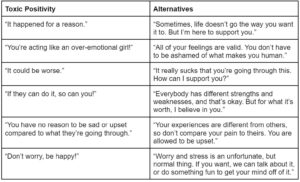We have all heard the sayings, “be positive!” and, “always look on the bright side!” from the people who care about us. But sometimes, even though they are just trying to help us out, these kinds of sentiments only serve to worsen our mood. That is because of something called toxic positivity.
Nowadays, we have all been hearing the word “toxic” thrown around. Toxic relationships, toxic masculinity, toxic environments… toxic, toxic, toxic! However, not many people have heard the term “toxic positivity.” That is why I am here, to explain it to you and provide you with healthier alternatives!
So, What Is Toxic Positivity?
According to Psychology Today, “toxic positivity is the act of avoiding, suppressing, or rejecting negative emotions or experiences.” Essentially, it refers to denying or demeaning others’ emotions, or forcing those around you to always just be happy. Sometimes, it can even escalate to the point that people who have experienced a devastating loss or trauma are told that “it happened for a reason” or “other people have it worse”. In many cases, toxic positivity is self-inflicted. Because of multiple factors, people pressure themselves to always be happy and never have a bad day. Often, this happens unconsciously or with good intentions. Unfortunately, good intentions do not always equate to good outcomes.
What Are the Consequences?
As we saw in the last paragraph, toxic positivity can deny and demean emotions that are perfectly normal and human. It can also isolate people, sending a message that no one cares about their feelings. To someone who has lost a loved one, it can feel like people never really cared about the deceased person. It also fails to solve the underlying reason for those negative emotions. Instead, it buries them deep beneath the shame and guilt of not being happy all the time. Toxic positivity can also cause stigma and doubt around people in abusive situations or with mental health problems, especially when the whole world is telling them that it’s not that bad. That they just need to have hope.
What Are Some Alternatives?
We all want to help out our loved ones, and learning this may have left you feeling confused and lost on how to proceed. But what we as a collective society needs to learn is that sheer, blinding positivity isn’t the only way to navigate our negative emotions. In fact, toxic positivity isn’t a way to do that at all! Instead, here are some other ways that you can be there for your loved ones.
Validate Their Feelings
We all know the feeling of being told to just “think happy thoughts!” when we are upset, and frankly, it does the exact opposite of cheering us up. Hearing that from someone just pushes you further into the deep, dark pit of despair.
A better way to go about sadness, anger, and all the other daunting emotions that we feel is to validate them. You may not understand these emotions that you or your loved ones are experiencing, and that is completely alright. But you can still acknowledge that they are normal. That they may make you feel horrible, but you are not a bad or abnormal person because you feel that way. In these situations, I find it best to sit with your emotions, and listen. Because there is always a root, and part of feeling better is to understand where these emotions came from.
Decrease the Stigma Around Feeling Bad
One of the reasons that toxic positivity is such a widespread yet unknown thing is because there is a huge stigma around emotions and a huge pressure to just be happy. Obviously, changing an entire society’s deep rooted views on a topic is no easy feat. But you can always start small. The biggest changes are sometimes in the smallest things. Talking to your family about mental health. Sitting with your friends and discussing all the different sides to being human. Establishing an open, non-judgemental space for communication within your relationships. Giving yourself time and space to feel, and to express those feelings. Because we all deserve mental health days when it becomes a little too overwhelming and a little too hard.
Replace the “Be Positive!” With “How Can I Support You?”
The most fleeting statements often stick with us for a very long time. So here are some other ways to verbally show your support.
A Final Quote
Finally, I have an Arab proverb that I feel reflects this message very well. It says, “Sunshine all the time makes a desert.” Often, the most profound things are short and simple, because they resonate with people. This proverb means that everything is not, and cannot be, perfect. Rain, or adversity, brings growth and resilience. Constant sunshine, and the world will be parched and dry. If it is always perfect, perfection ceases to exist.

